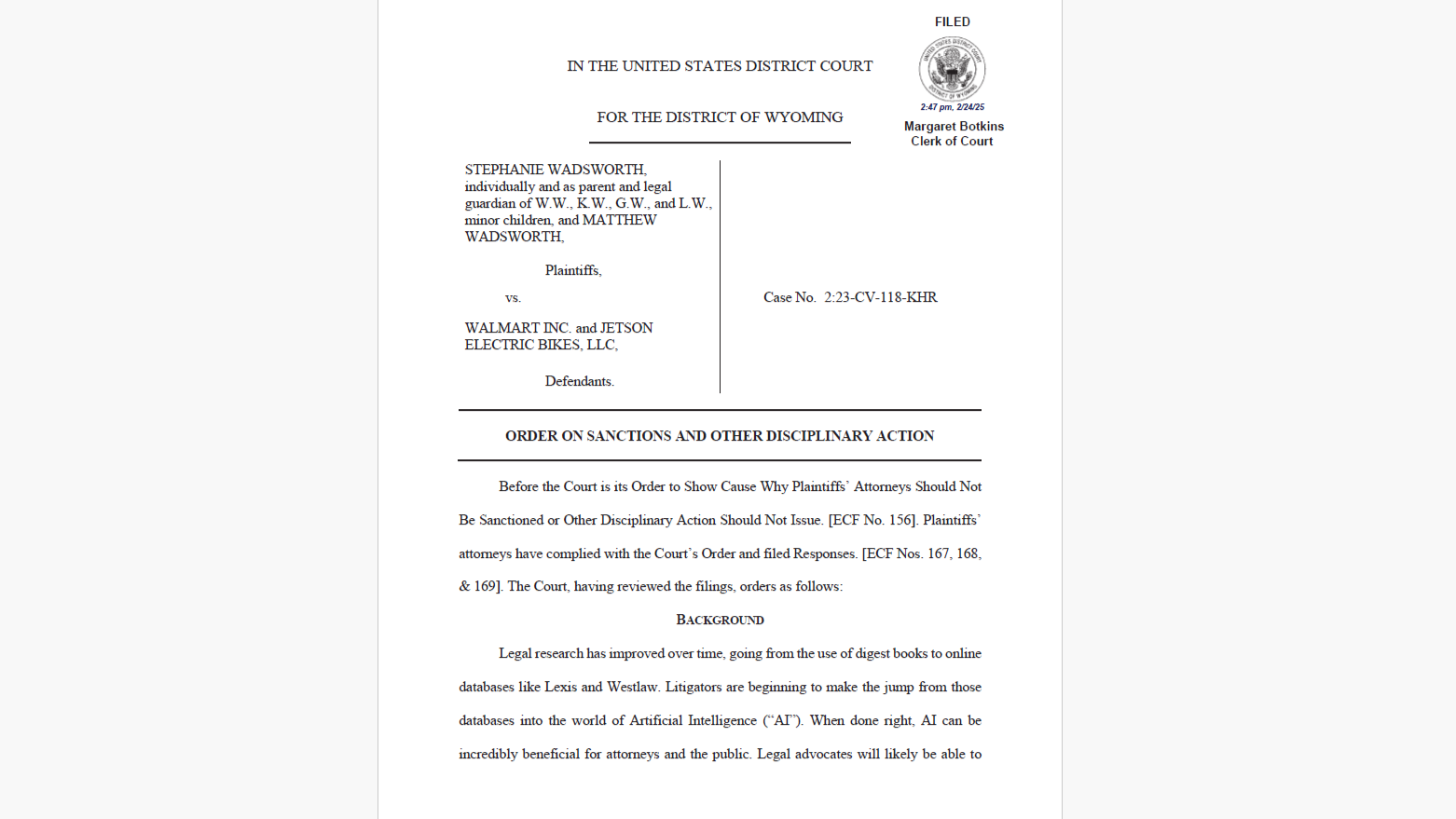You may have heard the news earlier this month that attorneys at plaintiffs law firm Morgan & Morgan — the 42nd largest U.S. law firm by headcount — were facing sanctions over their submission of court filings containing fake legal cases generated by artificial intelligence.
Now, the Wyoming federal judge presiding over the case, U.S. District Judge Kelly H. Rankin, in an order filed yesterday, has imposed sanctions on the three attorneys responsible for the filings, finding that they violated Rule 11 of the Federal Rules of Civil Procedure, which requires attorneys to conduct a reasonable inquiry into the law before making legal arguments.
In the products liability case, Wadsworth v. Walmart Inc. and Jetson Electric Bikes, LLC, Morgan & Morgan attorney Rudwin Ayala had his pro hac vice admission revoked and was ordered to pay a $3,000 fine, while supervising attorney T. Michael Morgan and local counsel Taly Goody, who has her own firm, were each fined $1,000 for their roles in submitting motions in limine that cited eight non-existent cases.
According to the court’s ruling, Ayala used his firm’s in-house AI platform, MX2.law, to generate case law when drafting the motions. He uploaded his draft and gave the AI system prompts that included “add to this Motion in Limine Federal Case law from Wyoming setting forth requirements for motions in limine” and “add more case law regarding motions in limine.”
Without verifying the accuracy of the AI-generated citations, Ayala included them in the filings, which were then signed by all three attorneys.
“A fake opinion is not ‘existing law’ and citation to a fake opinion does not provide a non-frivolous ground for extending, modifying, or reversing existing law, or for establishing new law,” Judge Rankin wrote, quoting Mata v. Avianca, Inc., a 2023 case from the Southern District of New York that was one of the first to address AI hallucinations in legal filings.
The court rejected arguments from Morgan and Goody that they should not be held responsible because they did not draft the motions. Judge Rankin emphasized that signing a legal document “ensures that the attorney read the document and conducted a reasonable inquiry into the existing law” and that this duty is “nondelegable.”
“Blind reliance on another attorney can be an improper delegation of this duty and a violation of Rule 11,” the judge wrote.
“Every attorney learned in their first-year contracts class that the failure to read a contract does not escape a signor of their contractual obligations … Similarly, one who signs a motion or filing and fails to reasonably inspect the law cited therein violates Rule 11 by its express terms.”
The court acknowledged that the attorneys promptly withdrew the motions after the order to show cause was issued, were forthcoming about the use of AI, paid opposing counsel’s fees, and implemented policies and training to prevent future occurrences. These remedial steps were considered mitigating factors in determining the appropriate sanctions.
Judge Rankin declined to sanction the attorneys’ law firm, noting that Morgan & Morgan had trained its employees not to use AI software in the way Ayala had and had since implemented an additional acknowledgment requiring users to independently verify AI-generated information.
In the opinion, Judge Rankin acknowledges the potential benefits of AI in law. “When done right, AI can be incredibly beneficial for attorneys and the public. Legal advocates will likely be able to quickly furnish on-point research and draft motions, which may save costs for the clients.”
Even so, he emphasized, “While technology continues to evolve, one thing remains the same — checking and verifying the source … As attorneys transition to the world of AI, the duty to check their sources and make a reasonable inquiry into existing law remains unchanged.”
For attorneys, the judge wrote, the takeaway is simple: “Make a reasonable inquiry into the law before signing (or giving another permission to sign) a document, as required by Rule 11. If an attorney does not do so, then they should not sign the document.”
 Robert Ambrogi Blog
Robert Ambrogi Blog